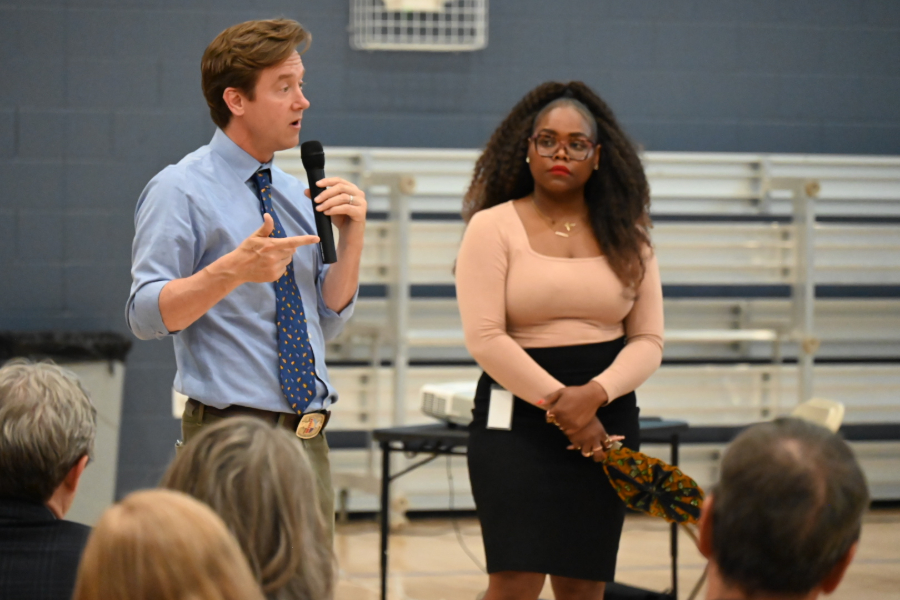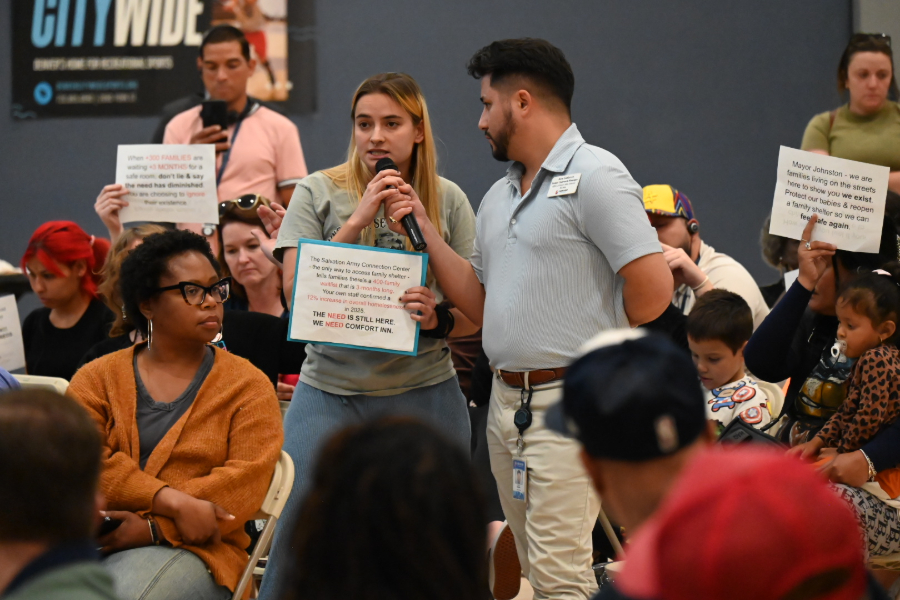
Bennito L. Kelty

Audio By Carbonatix
During a meeting with residents on Thursday, September 25, Denver Mayor Mike Johnston shared his strategy to close city-funded homeless shelters in the Central Park neighborhood and impose stricter guidelines for current shelter operators. But that’s just part of his plan for the large chunk of northeast Denver.
The mayor also revealed ideas to improve Quebec Street, the neighborhood’s main thoroughfare, including a community ambassador program as well as efforts to reduce retail theft and replace three bridges on the street. However, all of these plans still face a looming $200 million deficit in the city budget.
Johnston, who lives in Central Park, is now more than two years into his promise to solve homelessness in Denver, which he’s tried to do by largely renting and buying hotels to temporarily house hundreds of homeless residents while they look for jobs and permanent housing. The effort, dubbed “All In Mile High,” has solved about half of Denver’s homeless problems, according to his administration.
“We know when we opened this set of sites, this neighborhood was asked to carry a significant amount of the citywide population of folks we have who are homeless,” Johnston told a crowd of about fifty people. “Some folks were optimistic about that, some were worried about that, some had very fair concerns and frustrations…we’re moving in the right direction, and I want to thank you all for staying with us through a very eventful two years.”
Central Park has hosted more of Johnston’s hotel shelters than any other Denver neighborhood, including the Comfort Inn at 4685 Quebec Street and Stone Creek at 4595 Quebec Street. The neighborhood is also home to the Aspen at 4040 Quebec Street, a former DoubleTree where a double homicide took place in March 2024 that is still unsolved.
And that’s not the only shelter with a budgetary impact: The city has yet to put anyone in the former Stay Inn motel at 12033 East 38th Avenue in Central Park, but the lot in front of the motel is being used as a micro-community, or a few dozen shed-like housing units set up in a small area. The city bought the motel in late 2022, before Johnston took office, but never used any of its rooms to house homeless residents as planned.
According to Johnston, the city will close the Comfort Inn, which has 136 beds, by March 31 of next year to save around $11 million. He first announced the closure in mid-September, when he laid out his plan to solve the $200 million deficit by laying off city staff and cutting departmental budgets “to the bone,” but provided more details about shelter closures to Central Park residents on Thursday. Along with the Comfort Inn, the city will close Monroe Village, a micro-community at 4001 Monroe Street in the Elyria-Swansea neighborhood, by June 2026.
New “Performance-Based” Contracts
In addition to closing shelters, Johnston said that moving forward, the city will only pay shelter service contractors if they meet certain metrics, a change that was first shared in August.
Although the city owns or leases many of its hotel shelters, it doesn’t run the day-to-day operations at the sites. Instead, it relies on one-year contracts with organizations like the St. Francis Center and the Salvation Army to run those shelters. However, in August, the Salvation Army bowed out of renewing a contract to run the Aspen and Stone Creek amid complaints about security and accessibility of its shelters, though the organization explained it had other priorities. St. Francis ran the Comfort Inn.
Ahead of announcing new service providers for the remaining hotel shelters, Johnston said that the city will only sign “performance-based” contracts rather than its traditional contracts, which reimburse operators.
Johnston explained that for operators to be paid, the city will need to see that 80 percent of homeless residents in the shelter have had four case management meetings a month, 90 percent participate in conversations toward securing permanent housing, and 90 percent are in a “community queue” to exit the shelter and move into permanent housing. Johnston said the city can move people into permanent housing in just 35 days once they’re in the community queue. Under the new rules, a shelter operator also has to have 90 percent of its hotel shelter rooms in use for homeless residents throughout the year.
According to Johnston, there have been “times where some of the sites had rooms that were damaged or in disrepair, not well taken care of.”
“At times, we had 30 or 35 percent of rooms in a hotel that were offline. That could be 200 units. That could be an entire hotel-worth of rooms,” he told Central Park residents at the meeting.

For meeting each of those metrics, shelters operators will be awarded a portion of their contract. The most valuable metric is keeping 90 percent of the rooms occupied, which secures 45 percent of the contract. Other payments come when shelters hit goals for operation effeciencies and family case management meetings.
The mayor said that the city will announce new operators for its remaining hotel shelters “in the next couple of weeks.”
“We’re looking for folks with real demonstrated accolades of success, exiting people in environments that are safe and secure and supportive,” Johnston said. “We are very optimistic about what we’ll see from those providers.”
Community Support and Anger
A handful of protesters from Housekeys Action Network Denver (HAND), an advocacy group for homeless residents, attended Johnston’s town hall to criticize his closure of the Comfort Inn to save money. While he spoke, they held up signs reading “the need is still here” and “don’t sell the comfort.” Activist V Reeves argued that the city seems to always have money for downtown improvements, sports venues and the Denver Police Department, which is receiving a small budget increase in 2026.
“He really is prioritizing enforcement over actual support and services,” Reeves told Westword after the town hall. “It’s so frustrating to hear him say, ‘there’s no money, there’s no money,’ but there’s endless money to continue to police.”
When Reeves got the chance to speak, she told Johnston that he lied when he claimed during the town hall that no more families are in the street and demanded he not close the Comfort Inn because families live there. She continued to call him a liar while he tried to respond.

It created a tense scene, but Central Park resident Joel Hodge, who founded the nonprofit Struggle of Love and also goes by Coach Eye, stood up for Johnston.
“We shouldn’t, as a community, turn this into a bashing,” Hodge said. “Unfortunately, there’s been major cuts in funding just like there’s been all over America, but it should not drive or motivate Denver, Colorado, to not stick together and figure out how do we solve this.”
Members of the audience said they left the meeting feeling supportive of Johnston and optimistic that his accelerated homelessness plan will work. Central Park resident Jan Devor said that she liked the idea of the performance-based contracts and left the mayor’s town hall with “sympathy” towards his budget challenges. She also felt like he was poised to make “extreme progress towards solving the city’s most important issues” during the next two years.
“I certainly sympathize with people who want services now, but I think we have to work with him,” Devor said. “Mike Johnston has done a fabulous job with Denver.”
Retail Theft Reduction
According to data provided by Johnston, Central Park had nearly 1,200 retail-theft-related crimes in 2024 from January 1 to September 24. During that same time span this year, that number came down 5 percent, to 1,100 such crimes. The mayor also said that shoplifting is down 18 percent this year.
However, there have been high-profile incidents of theft documented in Central Park this year, including stolen items from mailboxes in the neighborhood and a “teen takeover” event at the Shops at Northfield, where retail theft has been a concern among locals.
According to Johnston, he launched a pilot program about five months ago to tackle retail theft in two popular shopping spots in Central Park: Quebec Square at 7800 Smith Road and the Northfield Shops at 8340 Northfield Boulevard . The program sends police to teach the retail store owners in those plazas how to make it harder to steal from their businesses.
“Where do you place equipment? How close are you to the door? What is the exit path?” Johnston explained. “There’s simple strategies retail store owners can use to make their site harder to target.”
The pilot program also entails an “increased priority on dispatching officers here for calls” and having more officers patrolling the area, Johnston said, explaining that the idea was to boost law enforcement’s presence in those two areas as a deterrent.
“We know that an officer visiting any commercial area has an impact of decreasing the likelihood of crime in that block by 90 percent for the next two hours,” Johnston said. “This has proven to be a very effective strategy.”

Community Ambassadors
In March, the newly formed Ballpark General Improvement District, a taxing entity that funds upgrades and services around Coors Field, launched a program where “community ambassadors” in maroon windbreakers patrol and clean up the area. Johnston said on Thursday the city wants to bring the same program to Quebec Street, to offer cleanup, trash pick-up and “pro-social behavior interactions” along the corridor.
“They are there to help support people, answer questions, and if you’re lost, they can help you,” he said. “If you’re suffering a mental health crisis and need someone, they’re the ones who can help. They’re the ones who can respond, help connect you to services.”
Johnston envisions four ambassadors working along Quebec Streets at a time, six to seven days a week. Denver City Council is expected to approve a deal by January 1 with a contractor to hire and manage those ambassadors.
“They do not wear a badge or a gun,” Johnston said. “It does not require us to use police department time, but it does allow us to have someone there regularly, all the time, to keep the space safe and clean.”
Quebec Street Bridges
Johnston promised to replace three “critical” bridges on Quebec Street: the Smith Road, Sandown and Airlawn bridges. All three are immediately south of Interstate 70, and the first two bring commuters over Quebec Street while the Airlawn bridge brings people over the small Airlawn Road. Johnston said the bridges are “very old,” having been around for more than fifty years, and are “three of the five top-priority bridges in the city.”
City Council kicked off budget hearings this week, and Johnston said that earlier this week, he and the council agreed on an $8 million investment to “get the bridges ready.” However, construction isn’t expected to start until 2027 or 2028.